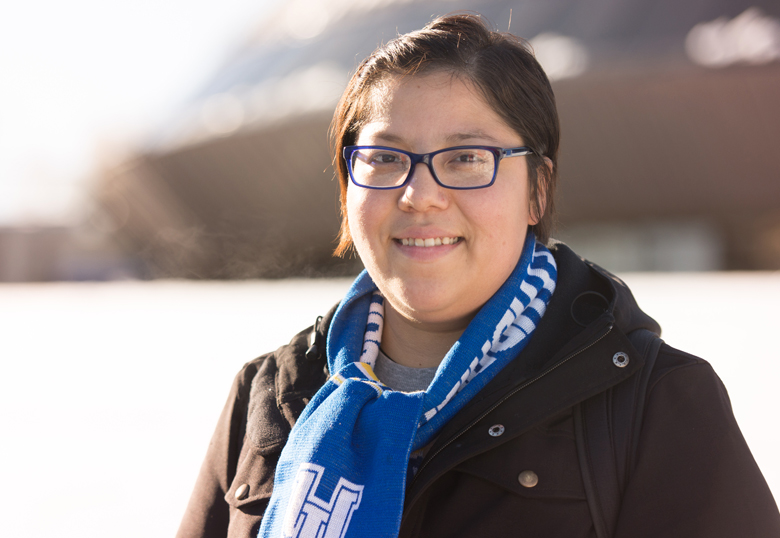Without the help of scholarships, Trishell Provost’s dreams of engaging youth in physical activity on the Piikani First Nation might well be foundering.
Her hard work and dedication earned her the highest grade point average and three scholarships at the end of her first year in the University of Lethbridge’s First Nations’ Transition Program. She received the Alice Takacs Achievement Award, the TD Bank Group First Nations’ Transition Program Bursary and The Masson Family First Nations’ Transition Program Award.

Provost is now in her second year of studies in kinesiology and her work ethic has continued to pay off. Last April, she received an Indspire Award, a scholarship specifically for aboriginal people.
“Without those scholarships I probably wouldn’t have been able to continue my studies,” she says. “I’m very grateful to donors and I give them a huge thank you for recognizing my hard work.”
Provost was born and raised on the Piikani First Nation and schooled in Fort Macleod. Her life revolved around sports, including hockey, soccer, basketball and softball, instilling in her a love of physical activity.
“I didn’t have much of a social life outside of my teammates. Every weekend I was at a tournament or a hockey or basketball camp,” she says.
She worked for a few years following high school but a youth initiative program on the reserve pointed her in the direction of massage therapy. She enrolled in the program at Lethbridge College and met her future husband there. After graduating, she worked at a few clinics and spas as a massage therapist in Lethbridge.
“My coworkers all came to the U of L or the college and a lot of my clients were university students. I told myself I could go back to school,” says Provost. “I really wanted to have something behind me in addition to massage therapy. I want to be able to go back and work on reserves to help with different programs for youth and elders to be more physically active.”
Provost’s four-year-old son, Mateo, inspired her to attend university. She remembers the strong foundation she received from her parents and their support of her involvement in sports.
“I want Mateo to have opportunities to do the things I was able to do when I was young. I think that will really benefit him. Having a stable job and a physical activity background, I’ll be able to encourage him,” she says.
Pursuing a degree while raising a child takes perseverance and commitment but Provost doesn’t have to look far to find a role model.
“My grandmother [Bernadette Pard, (BA’88)] went back to school when she was about my age. She got her BA and majored in history here at the U of L. She did so much; she wrote The Peigan: A Nation in Trasition and co-wrote Blackfoot Religion and the Consequences of Cultural Commoditization. She really stressed putting Blackfoot in the provincial curriculum,” says Provost. “Seeing her be able to make her voice heard and the importance of that really made me push to develop my own voice.”
Provost is working on a combined bachelor of arts and bachelor of education. She aims to understand the body at a physical level, especially how it pertains to children and the elderly. Last summer, she worked in Dr. Jon Doan’s lab where she digitized video data, arranged workplace visits for assessments and helped write research abstracts.
“It was definitely extraordinary to see my name on research posters and papers. In the back of my mind I would tell myself, ‘Yep, you did that; be proud of yourself!” she says.
Through her coursework, Provost realized not much research has been done on physical activity with FNMI people. She’d like to fill that gap one day.
Her eventual goal is to bring programs to the reserve that will engage youth in physical activities. She hopes it will become self-sustaining in the long run so that older youths will mentor their younger counterparts. She also plans to bring elders and youth together so that youth can encourage elders to be active and the elders can reconnect youth to their culture and language.
“I’d like to incorporate my background in massage therapy and physical activity to establish a mobile clinic to visit elders and motivate them to get active. Not only will it benefit the elders, it will provide jobs for other people,” she says.
Provost credits her grandparents, parents and siblings for giving her a solid upbringing and strong values. After finishing university, she wants to move back to the Piikani First Nation and put her skills to work.
“I want to contribute to making our nation a place for future generations to thrive,” she says. “I truly believe that, once someone can love themselves for who they are, then they can love those around them. If I can make a difference in one or many persons' lives through physical activity, I would be so grateful.”
**
Learn more about giving at the University of Lethbridge and how you can help students like Trishell.
